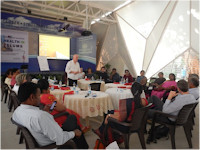 Last month, Prof. Luc de
Witte and Prof Mark Hawley joined project partners in Bangalore, India for a
2nd workshop as part of our international project “a mobile diagnostic and
screening toolkit for urban slums settings”.
Last month, Prof. Luc de
Witte and Prof Mark Hawley joined project partners in Bangalore, India for a
2nd workshop as part of our international project “a mobile diagnostic and
screening toolkit for urban slums settings”.
18 participants from our
local partners attended the workshop, held in Bangalore Baptist Hospital,
Bangalore. This included technology experts, health professionals and community
health workers with experience working in urban slums.
The workshop aimed at reaching
a consensus between the team and project partners on the design of the mobile
toolkit. Many exciting discussions were
undertaken covering a range of topics from key consideration in the design of
the toolkit, the toolkit content, to the tests and technology that will be
included.
At the end of the workshop, the team agreed on the next phase of the
project which will include designing and evaluating a basic prototype of the
toolkit. 
For
more information about the project, please visit the link below:
http://www.catch.org.uk/current-project/urban-slums-settings/
Written by Sarah Abdi (Centre for Assistive Technology and Connected Healthcare) Email: s.q.abdi@sheffield.ac.uk



